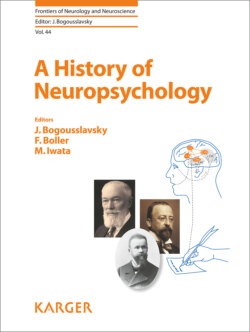Читать книгу A History of Neuropsychology - Группа авторов - Страница 61
На сайте Литреса книга снята с продажи.
Neuropsychological Interpretation
ОглавлениеImura thought the essential trouble in Gogi aphasia is an impairment of the “dictionary” meaning of words, which is rather fixed and has relatively independent meaning even in a sentence. He asserted that impairment of sentence comprehension even if present is only secondary, compared to the primary impairment of word comprehension [16].
He further argued that word meaning should not be regarded as referent or things meant. In other words, meaning is not an entity. Rather it is a relation between a name and its concept. A name evokes a mental image, while at the same time the evoked image evokes back the name. This “close co-occurrence” of 2 psychological processes is the basis of meaning. In Gogi aphasia, this co-occurrence becomes unstable. This is reflected in the patient’s difficulty not only in comprehending word meaning but also in evoking a sound image of the word [16, 17]. Imura called Gogi aphasia “semantic form of aphasia” [14] or “semantic-form aphasia” [17] contrasting it with “phonetic form of aphasia” such as Broca’s and Wernicke’s aphasia.
As for the fourth feature of Gogi aphasia, Imura’s stance was rather vague. Although he included it as one of the core features of Gogi aphasia, he was prudent to regard the difficulty as an integral part of the syndrome. Thus, in the original paper [1], he admitted that no complete correspondence between symptoms of speech and written language could be confirmed, since every case he had encountered did not necessarily show this pattern of difficulty in written language. But in the subsequent papers, he seemed to have gained confidence to claim that this particular pattern of kanji-kana dissociation is an essential part of the syndrome [14, 16, 17]. Imura also argued that the selective difficulty in kanji handling in Gogi aphasia is caused by its logographic nature, in which a single kanji character stands for multiple sounds and concepts simultaneously [16]. This complexity necessarily burdens a reader with the decision making to choose a correct pronunciation from possible candidates every time he has to read a sentence aloud.
Later studies either included the fourth feature of Imura’s Gogi aphasia as one of the core symptoms [5, 9] or excluded it as coincidental [18, 19].
